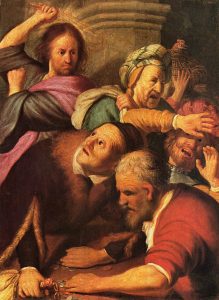Thoughts on Sunday’s Lessons for March 7, 2021
First Reading: Exodus 20:1-17
During the first three weeks of Lent we remember God’s three great covenants with the people: God’s promises through the ages given to Noah, Abraham, and now Moses.

Christ Driving the Money-changers from the Temple (1626), oil painting on oak wood by Rembrandt Harmenszoon van Rijn (1606-1669). Pushkin Museum of Fine Arts, Moscow. (Click image to enlarge.)
God’s thunderous voice shakes Mount Sinai as the awed people hear the Ten Commandments that sum up the principles by which we live with love for God and each other. Hear God’s voice and follow these commandments, God has told Moses in the verses just before these bedrock principles, and you will be God’s treasured possession among all the people.
Psalm: Psalm 19
In an appropriate sequel to the first reading, we hear this familiar hymn of praise and thanksgiving, sung in beautiful, poetic language, exulting at the beauty and wonder of all God’s creation, God’s gift to all the people of the world and to all the span of the universe. Within that creation, the hymn sings on, God’s laws and statutes – the great commandments – give us wisdom and joy and lead us to righteousness.
Second Reading: 1 Corinthians 1:18-25
Paul’s first letter to the people of Corinth begins with a simple but challenging pastoral issue: The community is splitting into factions, each following a different leader. Paul urges them to stay united by following the Cross, Paul urges them. Never mind if their Jewish and Gentile neighbors mock Christians as foolish for worshiping a man who was brutally executed on the Roman cross, he says. The cross was a symbol of pain, shame and degradation, a seemingly foolish conclusion in the eyes of people who were expecting a warrior Messiah who would overthrow Rome with power and might. But that doesn’t matter, Paul writes, because Christians prefer God’s foolishness to mere human wisdom. God’s weakness far outweighs human strength.
Gospel: John 2:13-22
During the first weeks of Lent we quickly touched on Mark’s narrative of Jesus’ public ministry, from his baptism and prophetic teaching to Peter’s recognition that Jesus is the Son of Man, the Messiah. Now we turn to John’s Gospel for the rest of the season, beginning with John’s colorful account of Jesus throwing the money-changers out of the temple. This narrative appears in all four Gospels, but curiously, while Matthew, Mark and Luke all place it at the beginning of Holy Week, in John we find it near the beginning of the Gospel, during an earlier trip to Jerusalem for Passover that none of the other Gospels mention. Moreover, John alone goes into such detail: Not only did Jesus throw over the money changers’ tables, but he made a whip of cords to lash them in his anger at their exploiting the poor in the name of God. At the end, Jesus foreshadows his own passion and death. To the outrage of temple leaders, Jesus likens his own body to the temple and declares that he will raise it up three days after its destruction.
